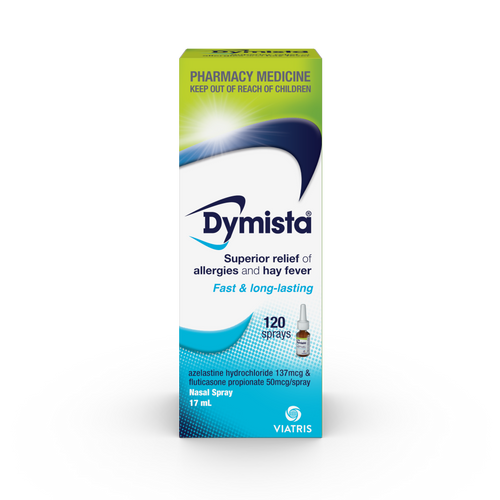Dymista® Nasal Spray relieves the symptoms of allergies, for example: symptoms relating to the nose - runny nose, post nasal drip, sneezing, itchy or blocked nose and symptoms relating to the eyes - itchy, watery and red eyes.
Due to the fast relief and the anti-inflammatory effect, Dymista® Nasal Spray is more effective on symptoms relating to the nose and eyes than either antihistamine or corticosteroid therapy alone.
Dymista® Nasal Spray is sprayed into the nose to treat allergic rhinitis (hayfever and other allergies) and rhinoconjunctivitis (allergy-induced symptoms in the nose and eyes) in adults and children 12 years and older where use of a combination (intranasal antihistamine and glucocorticoid) is appropriate.
When you must not use it
Do not use the medicine if you have an allergy to azelastine hydrochloride or fluticasone propionate or any of the other ingredients listed at the end of this leaflet.
Dose
Adults and adolescents (12 years and older)
One spray in each nostril twice daily (morning and evening). Do not exceed this dose.
Do not use in children under 12 years.
Do not use for longer than 6 months except on the advice of a healthcare professional.
Ingredients
DYMISTA nasal spray is a fixed combination product containing the following active ingredients: azelastine hydrochloride and fluticasone propionate.
Each gram of suspension contains 1 mg azelastine hydrochloride and 0.365 mg fluticasone propionate. One spray (137 mg) contains 125 micrograms of azelastine (as the base) and 50 micrograms of fluticasone propionate.
Excipient with known effect
One spray (137 mg) contains 14 micrograms of benzalkonium chloride.
DYMISTA nasal spray contains the following inactive ingredients:
- disodium edetate
- glycerol
- microcrystalline cellulose
- carmellose sodium
- polysorbate 80
- benzalkonium chloride
- phenethyl alcohol
- purified water
Storage
Store below 25°C. Do not refrigerate and do not freeze.
CONSUMER MEDICINE INFORMATION
General Safety Information
- Always read the label. Use only as directed.
- Nutritional supplements may only be of assistance if the dietary intake is inadequate.
- Supplements should not be used to replace a healthy balanced diet and adequate physical exercise.
- Keep all medications and supplements out of reach of children.
- If symptoms persist see your healthcare professional.

